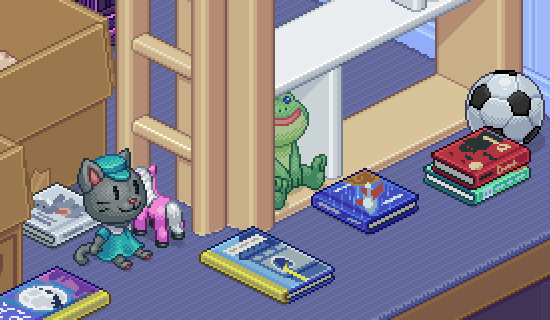what is unpacking?
"Unpacking", developed by indie studio Witch Beam, is a narrative-driven puzzle game where players unpack the protagonist's life and face the emotions that come with her biggest changes.

subtle storytelling
The game progresses from 1997, in the protagonist's childhood bedroom, to her “forever home” in 2018 with a character hinted to be her girlfriend as they plan a future together.
 |
|---|
 |
 |
 |
 |
 |
 |
 |
 |
 |
 |
 |
Through subtle storytelling, such as her love of role-playing games that she picks up from her roommates, enjoying fancy coffee after living with her ex-boyfriend, and the objects that travel with her all the way to adulthood, Unpacking works every bit of the main characters life into the story without using any dialogue.
The games creative director, Wren Brier, stated in an interview with Game Developer that the initial concept for Unpacking was inspired by a real-life unpacking session, “Some things about the experience seemed very game-like to me… The idea really came together when we decided to use a series of moves to tell a characters life story.”
Some of the biggest story beats in the game cover little things about the protagonist: her cultural Judaism, the items she loves (like her plush toys and art supplies), and her relationships with the people that we don't see but exist around her.
In 2010, just after graduating from university, she moves in with her boyfriend. The developers make a note to show that their stuff combined does not fit together.
When moving her stuff into his place, it's clear by how the player has to shuffle objects around that he has not made room for her belongings besides the bottom drawers of his closet and two hangers.


Brier said, “...the boyfriend actually ended up being even more unlikeable than we initially intended because we leaned really hard into making his stuff needlessly take up as much space as possible, making the player character have to fight for every inch of space.”
One of the hardest hitters of this level is the place that the protagonist’s degree ends up. It's made clear that her degree is important to her — it's framed and so, of course, players will assume its rightful spot is hung up on the wall. But, when moving in with the boyfriend, the only open spot at the end of the level is under the bed.
identity/acceptance
Queer representation in gaming, even as subtle as it is in Unpacking, is important, as outlined by Noah Haggerty in his research article Making video games for queer people is about more than queer characters for Northeastern University, “The subjects discussed how, with few games out there with explicitly queer mechanics, queer people introduce their own rules and gameplay into popular games — alternative approaches that don’t necessarily include romance or sexuality.”
He quotes Jailyn Zabala, an Interdisciplinary Design and Media Ph.D. student at Northeastern who identifies as nonbinary and bisexual, “Queer people are making those [traditionally straight and heteronormative] games [like PUBG] work for them in terms of queer readings of the games or just making up their own backstories for characters.”

While Unpacking doesn't explicitly state the character's identity, it implies it through objects found within her different homes (rainbow socks and stereotypical “bisexual clothing” like plaid shirts) to emphasize the protagonist discovering her own sexuality as she ages.


In Queer Game Studies, a collection of essays that analyze queer representation in the realm of video games, Naomi Clark writes, “Vocal critics, many of them consumer fans, have attacked many of the games [like Gone Home and Unpacking]… on the basis that they're “not real games” or “just very simple games”.”
Brier, who is bisexual herself, says to Eurogamer, though, that the game and the character are more than that:“One part is that she's an artist. And one part is that she's queer. And one part is that she loves plush toys. All of these are elements of the character and not defining characteristics."
Shana Jain writes on Unpacking in an article for NYU Comm Club, “If the player misses [the socks] in this chapter, the final level in July 2018 shows the main character moving in with this partner and setting up a nursery, and the final credits make it undeniable that the main character is in a queer relationship with another woman.”

player agency
Unpacking, as described by the developers, is meant to allow the players to decide where things go based on their real life organizational habits.
Originally, the game was a lot more strict on where stuff could be placed, taking inspiration from Brier and Dawson's own homes. But during the demo stages, this control was loosened to put more power in the players hands.
Brier writes in a Reddit AMA, “We built the character and her life (as well as the supporting characters) out of our own experiences, so there are bits and pieces that I can point to and say "this was something that happened to me" or "I lived in a place similar to this one”.”

Anna German writes for Intermittent Mechanism, “Unpacking, at its core, is about evoking a certain feeling that's generated when we go through old belongings. The only real places you can fail in the game are in service of developing that feeling and as a result the story… Winning Unpacking isn't just about getting to the end and emptying every box but also learning something along the way about the person whose life we're unpacking and as a result the human condition as a whole."
While you, as the player, aren't placed to ‘be’ our protagonist in a traditional sense — you aren't in first-person mode, or given much information directly about her besides what's revealed from the objects that move with her — there's much to say regarding player's agency surrounding how you and other people play Unpacking.


In Unpacking Vulnerability, Empathy and Player Agency, Ruth Cassidy writes, “Watching other people play Unpacking, then, is a whole new layer… It’s that moment when you walk down the street and realise that every single stranger, whose presence is fleeting in your life, has lived an entire history up until that moment. They have their own passions, their own relationships, their own spirituality and their own knick-knacks.”
